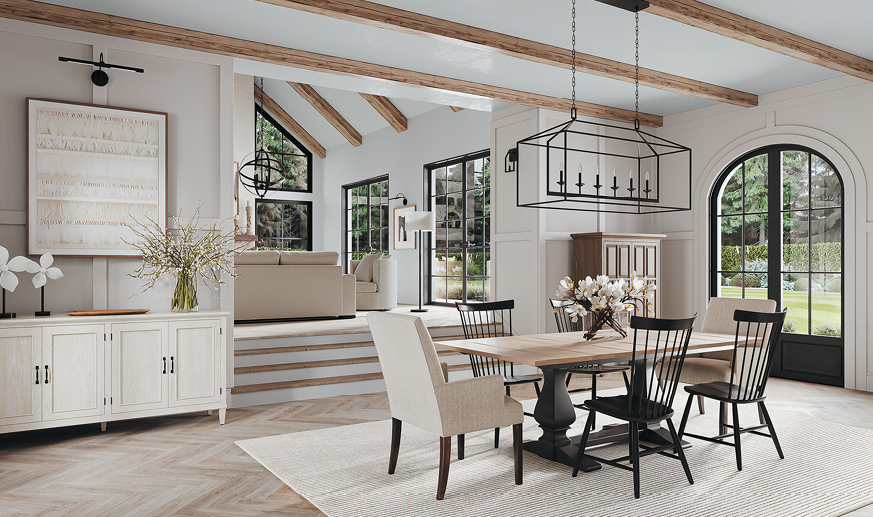- Home
- Media Kit
- MediaJet
- Current Issue
- Past Issues
- Reprints (PDF)
- Photo Specifications (PDF)
- Contact Us
- PRIVACY POLICY
- TERMS OF USE
![]()
ONLINE
![]()
ONLINE

The Interior Design Destination
Editors’ Note
Farooq Kathwari has been Chairman and CEO since 1988 and President since 1985. He serves in numerous capacities at several nonprofit organizations including the Board of Overseers of the International Rescue Committee; the advisory board of the Center for Strategic and International Studies; and the Council on Foreign Relations. He is Chairman Emeritus of Refugees International; an advisory member of the New York Stock Exchange; former Chairman of the National Retail Federation; Director Emeritus and former Chairman and President of the American Home Furnishings Alliance; a Director of the Institute for the Study of Diplomacy at Georgetown University; Co-Chairman of the Muslim-Jewish Advisory Council; and a member of the International Advisory Council of the United States Institute of Peace. He served as a member of the President’s Advisory Commission on Asian Americans and Pacific Islanders from 2010 to 2014 and was tapped to join the congressionally mandated United States Institute of Peace bipartisan Task Force on Extremism in Fragile States co-chaired by Governor Tom Kean and Congressman Lee Hamilton, who formerly led the 9/11 Commission. Among his recognitions, Kathwari is a recipient of the 2018 Ellis Island Medal of Honor and has been inducted into the American Furniture Hall of Fame. He has been recognized as an Outstanding American by Choice by the U.S. Government. He has received the Yale School of Management’s Chief Executive Leadership Institute Lifetime of Leadership Award; the National Human Relations Award from the American Jewish Committee; the National Retail Federation Gold Medal; and Ernst & Young’s Entrepreneur Of The Year™ Award. He has also been recognized by Worth magazine as one of the 50 Best CEOs in the United States. Kathwari holds a BA in English literature and political science from Kashmir University, Srinagar, and an MBA in international marketing from New York University. He is also the recipient of three honorary doctorate degrees.
Company Brief
Ethan Allen Interiors Inc. (ethanallen.com) is a leading interior design company and manufacturer and retailer of quality home furnishings. The company offers free interior design service to its clients through the efforts of approximately 1,500 in-house interior designers and sells a full range of furniture products and decorative accessories through its website and a network of approximately 300 Design Centers in the United States and abroad. Ethan Allen owns and operates nine manufacturing facilities including six manufacturing plants in the United States, two manufacturing plants in Mexico, and one manufacturing plant in Honduras. Approximately 75 percent of its products are made in its North American plants.

An Ethan Allen Design Center in Danbury, Connecticut
How do you describe Ethan Allen’s culture and values?
In 1932, two young entrepreneurs went from New York City to the Green Mountains of Vermont and started making early American furniture. They took on the “revolutionary” values of pioneer Ethan Allen, who had fought in the American Revolution and helped form the state of Vermont. The culture of revolution and innovation was also part of my background, and treating people fairly was important. About 30 years back, we developed 10 Leadership Principles to define our values. These values include hard work, treating people with dignity, focus on innovation, and speed.
What have been the keys to Ethan Allen’s ability to stay relevant for more than 90 years?
Making constant change a part of the culture within our organization has been key. Also, our culture emphasizes the need to make change when you’re about 75 percent ready – because if one waits to be 100 percent ready, the chances that change will take place are not so good. Also, constant change involves risk, and some initiatives may not work. It’s important not to “punish” leaders for initiatives that may not work. Obviously, great care has to be given to making sure that initiatives can be understood. People also have to be open to risk.
How important has it been for Ethan Allen to be a vertically integrated company, and do you see this as a differentiator for Ethan Allen?
Vertical integration is important; it requires long-term thinking and investment. It also requires the constant involvement of both team leaders and team members to understand the key initiatives that will be required. This is a long-term philosophy and requires lots of work and investment. Today, we have a network of just under 175 interior design centers in North America with the longest-serving interior design professionals in the U.S. We manufacture about 75 percent of our products in our North American plants, and we deliver our products at one cost to our clients throughout North America. This gives us control over the quality of our products, the level of service we provide, and in the end, control over our destiny.
What have been the benefits of Ethan Allen having 75 percent of its manufacturing in North America?
Many companies have moved their manufacturing overseas, but we have committed to keeping our manufacturing base right here in North America. This commitment is very important because it empowers us to manage our process from start to finish, which ensures that we safeguard our reputation for quality. Keeping manufacturing in North America also supports our branding as the Interior Design Destination, ensuring a high level of customer service and diversity of styles.
The proximity of our manufacturing also helps us to respond quickly in the face of changing events. You’ll recall the port workers strike in late 2024 – businesses that bring in most of their product from overseas would have been seriously impacted, but because we make things in North America, we knew we would be able to minimize service issues. We have the advantage of experienced labor and high-quality materials in our manufacturing, and proximity in our logistics, because we manufacture in North America.

A farmhouse furnished by Ethan Allen
How critical is innovation for Ethan Allen and where is innovation impacting Ethan Allen’s business?
Innovation is critical – you have to create a culture of innovation and make innovation a state of mind. Earlier, I mentioned our unique combination of personal service and technology in terms of our interior design experience – because with the latest technology in their hands, our interior designers can offer even better one-on-one service. One example is our 3D Room Planner, which we introduced in 2020, and which has become indispensable to our designers. What would have taken them days to draw, they can now plan in a few hours, and clients can get a very close approximation of what their finished space will look like. Clients like it because it helps them make selections with confidence. Technology innovations like these have been critical to our reinvention as the Interior Design Destination.
The fact is, we combine technology and personal service throughout our vertically integrated enterprise, from manufacturing to retail, logistics, and communications. Take manufacturing, as I said earlier: By introducing certain technology and recruiting talented people to program and operate it, we can both produce functional furniture parts more quickly and support the creation of more one-of-a-kind decorative furniture elements – all without letting go of the milling and kiln-drying, the hand-assembling and hand-finishing, that make our furniture both beautiful and long lasting.
What are your views on the future of interior design and what will be the keys for Ethan Allen to remain at the forefront of the industry?
One of the things I hear repeatedly from our interior designers is that clients want personal service and great products. That’s why our complimentary design service and our design technology are so important, along with the fact that we make most products to order. It’s increasingly important to be flexible and to work with clients wherever they feel most comfortable, whether that’s in their home or in the Design Center. Our designers even provide remote project management, working with blueprints supplied by clients and sharing 3D plans, sometimes without ever meeting in person.
I think the future of design is less about a style direction or trend and more about cultivating collaborative partnerships: By getting to know clients and understanding their personalities, our designers can provide the “one of a kind” that clients are looking for. Most of our designers have long-term relationships with their clients; they start with one room, and then clients come back for phase two, phase three, and more. The repeat business is valuable; the long-term relationships that we build are priceless.
How important is it for Ethan Allen to build a diverse and inclusive workforce?
It is critical. Today, our workforce represents people with diverse talent and backgrounds in our manufacturing, retail, logistics, marketing, and other areas. This includes team members in various parts of North America including the U.S., Canada, Mexico, and Honduras. Our associates take pride in their work and respect the diversity. In certain communities, we make a point to honor local customs. In our Silao, Mexico, upholstery workshop, for example, we celebrate local holidays like Mexican Independence Day and the Virgin of Guadalupe Day, and we do it because it communicates respect for all our associates. We also have many women in leadership roles: 71 percent of our retail leaders and 65 percent of our leaders at our headquarters are women, and we’ve increased the percentage of women in manufacturing leadership.
Do you feel that leading companies today have a responsibility to the communities they serve?
Ethan Allen has a long history of responding to the needs of our communities. In 2020, we devoted several of the lines in our Maiden, North Carolina, upholstery plant to manufacturing personal protective equipment (PPE) during the COVID-19 pandemic. When our Orleans, Vermont, wood furniture plant flooded in 2023, rather than abandoning manufacturing operations in Vermont, we worked with both our associates and with state government to get our plant back up and running.
Companies that have a workforce in developing countries often experience high turnover because associates face obstacles that get in the way of coming to work, from issues with consistent transportation to the availability of both acute and preventive medical care. In both Silao and in our wood furniture plant in Honduras, we offer on-site medical care and health fairs. In Silao, we provide transportation to work and free meals for our associates. When you treat associates with dignity and respect, you can achieve incredible things.
What do you feel are the keys to effective leadership?
I start with the philosophy that a leader’s main job is to make their people better, and one of the keys to making people better is constant communication. I receive 50 weekly reports focusing on shared priority areas – talent, service, marketing, technology, and social responsibility – along with WOW stories that mark exceptional service from all areas of our business. I make it a point to personally respond to each story.
What are you most excited about as you look to Ethan Allen’s future?
I am pleased by just how relevant we’ve managed to remain after 93 years in business – as I always say, we’re just getting started. We are proud of the diversity of our products, the technology that has made our service even more relevant to our clients, and the exceptional quality that continues to define us. I have a great, motivated, and diverse team, and when the right people are in the right positions, good things happen. We are focused on the future, entrepreneurial yet disciplined, and well positioned for whatever comes our way.![]()